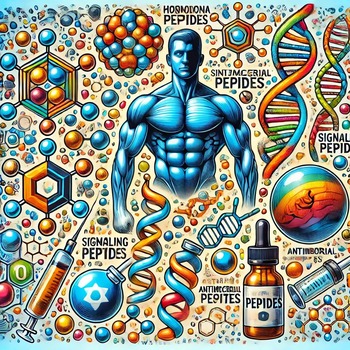All About Peptides
Peptides are molecules formed by amino acids, the building blocks of proteins, connected by peptide bonds. These short peptides typically range from 2 to 50 amino acids in length and perform several critical functions in biological systems:
- **Hormonal Functions**: For instance, hormones like insulin are peptides and play a crucial role in regulating blood sugar levels.
- **Signaling**: Peptides serve as important signaling molecules, facilitating communication between cells.
- **Antimicrobial Activity**: Certain peptides naturally combat bacteria and other microorganisms.
- **Drug Development**: Peptides are employed in therapeutic drug development, targeting specific biological mechanisms.
- **Nutrition and Sports Performance**: Peptides are included in nutritional and sports supplements to promote protein synthesis and muscle growth.
Types of Peptides
Peptides are integral to various fields such as biotechnology, drug development, nutritional science, and biological research. They are formed by linking amino acids with peptide bonds and can have diverse functions. Based on their length, peptides can be categorized as follows:
- **Oligopeptides**: Consisting of approximately 2 to 20 amino acids, these peptides often play roles in cellular communication and signal transduction.
- **Polypeptides**: These are longer chains of peptides, ranging from 20 to 50 amino acids. Hormones like insulin fall under this category.
Peptides can also be classified based on their functions:
- **Hormonal Peptides**: Examples include insulin and glucagon, which are vital for regulating blood sugar levels.
- **Signal Peptides**: These facilitate communication between cells, such as neuropeptides that enable nerve cell interaction.
- **Antimicrobial Peptides**: Naturally produced by the immune system, these peptides defend against microbes.
- **Structural Peptides**: Found in structural proteins, such as collagen.
- **Peptides for Drug Development**: These specifically bind to biological targets for therapeutic purposes.
Each type of peptide has distinct biological roles based on their molecular structure and function, making them essential in biotechnological, medical, and biochemical applications.
Bodybuilders often prefer GH peptides for building clean muscle mass. The most renowned brand is Genotropin by Pfizer, among others like Lilly, Saizen, and various Chinese brands.
Side Effects of Growth Hormone (GH)
The use of growth hormone (GH) can lead to various side effects if not managed correctly. Here are some potential side effects of GH:
1. **Excessive Growth**: Overuse of GH can result in acromegaly, causing abnormal growth in the face, hands, feet, and internal organs.
2. **Sugar Metabolism Disorders**: GH can increase blood sugar levels, heightening the risk of insulin resistance and type 2 diabetes.
3. **Cardiovascular Diseases**: GH use can negatively impact cardiovascular health, increasing the risk of high blood pressure and cardiovascular diseases.
4. **Joint and Muscle Issues**: GH may cause joint pain and stiffness, along with muscle cramps and aches.
5. **Psychological Effects**: Users have reported mood changes, including anxiety, depression, irritability, and sleep disturbances.
6. **Hormonal Imbalances**: GH use can disrupt natural hormone production, causing serious issues like premature closure of growth plates in adolescents.
7. **Cancer Risk**: Some studies suggest a potential increase in cancer risk with long-term GH use, although more research is needed for definitive evidence.
These side effects are more common when GH is used uncontrollably or illegally. GH therapy should only be used under medical supervision for legitimate indications. Using GH to enhance sports performance poses significant health risks and violates sports ethics.
**Sources**:
- [Wikipedia - Peptide](https://tr.wikipedia.org/wiki/Peptit)
- [Molecules: A Very Short Introduction](https://archive.org/details/moleculesverysho0000ball)
- [Wikipedia - Category: Peptides](https://tr.wikipedia.org/wiki/Kategori:Peptitler)






















